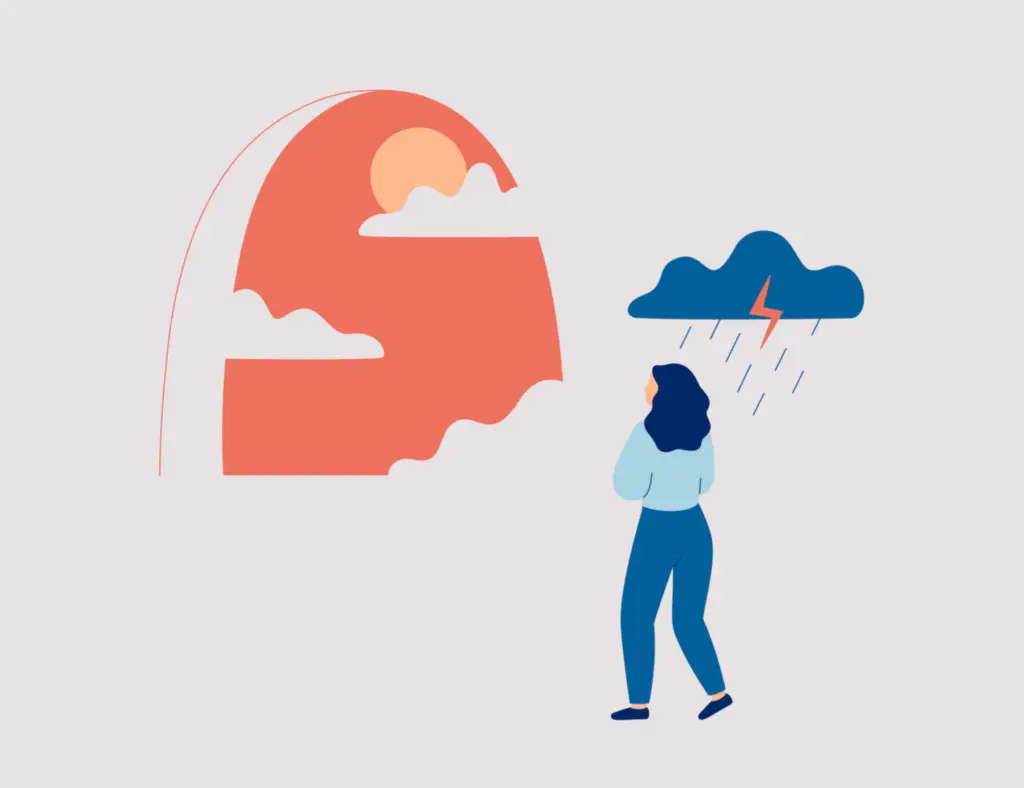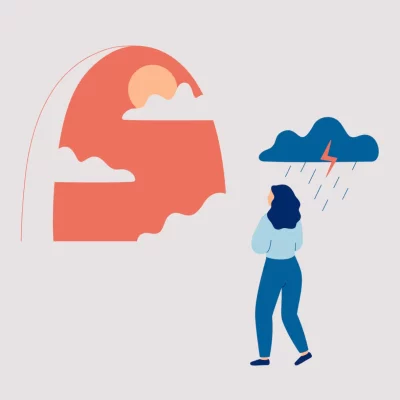Depression can feel like a heavyweight that is impossible to shake. But don’t worry, you are not alone. Millions of people around the world deal with depression every day. There is no one-size-fits-all solution, but there are practical coping skills for depression that can help make your life a little bit easier.
In this blog post, we will discuss 9 coping skills that have been shown to be effective for people with depression.
1. Get organized
When you are feeling overwhelmed and depressed, one of the best things you can do is get organized. This can mean different things for different people. For example, maybe you need to declutter your living space, or perhaps you need to create a daily schedule to help you stay on track. The key is to find something that works for you and stick to it.
When you have a plan and a routine, it can help reduce the anxiety and stress that comes with feeling like you are constantly juggling too many things. Getting organized can also help you feel more in control of your life, which can be a valuable coping skill during times of depression.
If you find it challenging to get started, plenty of resources are available to help you get organized. For example, websites, apps, and even professional organizers can help you create a system that works for you. Check out this BESTLIFE blog post, The 20 Best Apps For A More Organized Life.
Don’t be afraid to ask for help if you need it. Getting organized is a process, and it might take some time to figure out what works best for you. But once you find a system that works, it will be worth the effort.
Reasons Getting Organized Is Helpful:
- can reduce anxiety and stress
- helps you feel in control of your life
- can make it easier to accomplish goals
2. Set realistic goals for yourself
When you are dealing with depression, it can be difficult to see the light at the end of the tunnel. But setting realistic goals for yourself can be a great way to start making progress.
When you are feeling down, it is important to set achievable and manageable goals. This doesn’t mean that you should set the bar low, but rather that your goals should be something that you can reasonably achieve in a given amount of time.
For example, if you struggle to get out of bed in the morning, your goal might be to shower and get dressed each day.
If you set your goal too big, you will likely become discouraged and give up. But if you break down your goal into smaller steps, it will be much easier to accomplish. And as you start to check items off your list, you will begin to feel a sense of accomplishment and progress.
Remember, it is important to be patient and take things one step at a time. Don’t expect to achieve all your goals overnight. It will take time and effort, but eventually, you will see progress as you implement these coping skills for depression.
Reasons Setting Realistic Goals is Helpful:
- helps you feel more in control of your life
- makes progress feel achievable and manageable
- allows you to celebrate small accomplishments
3. Exercise regularly
When you’re depressed, one of the best things you can do is get moving. Exercise is a practical coping skill for depression.
Not only does exercise release endorphins, which can improve your mood, but it also helps to get rid of negative energy and stress. It can also help to improve your self-esteem and confidence.
If you are not currently active, start small and work your way up. Taking a brisk walk around the block is a great place to start. You can also try other activities like yoga, swimming, or biking.
Just be sure to find an activity that you enjoy and stick with it. For example, if you find yourself struggling to make time for exercise, consider waking up early or working out during your lunch break.
The key is finding a way to fit it into your schedule and prioritize it.
Reasons Exercising is Helpful:
- releases endorphins, which can improve mood
- gets rid of negative energy and stress
- helps improve self-esteem and confidence
- can be done during lunch break or early in the morning
4. Eat a balanced diet
When you are dealing with depression, it can be challenging to make healthy decisions about what to eat. But eating a balanced diet is essential on this list of coping skills for depression.
Eating a healthy diet can help to improve your mood and energy level. It can also help to boost your immune system and increase your overall sense of well-being.
If you are not currently eating a balanced diet, start small and work your way up. Add one or two new healthy foods to your diet each week. Try incorporating fruits and vegetables, lean protein, whole grains, and healthy fats into your meals.
Be sure to avoid processed foods, sugary drinks, and unhealthy fats.
Eating a healthy diet doesn’t have to be expensive or time-consuming. However, there are plenty of healthy recipes that can be made in a short amount of time.
The key is to find what works for you and to make healthy eating a priority.
Reasons Eating A Balanced Diet is Helpful:
- helps improve mood and energy level
- boosts immune system
- increases overall sense of well-being
5. Connect with family and friends
It is important to connect with family and friends when you are feeling depressed. Spending time with loved ones can help to improve your mood and make you feel supported.
If you feel isolated, reach out to family and friends and let them know how you are feeling. They may be able to offer support and understanding.
If you don’t feel comfortable talking about your depression with family and friends, try spending time with them in a more casual setting. Go for a walk, have dinner, or watch a movie together.
The key is to find ways to connect and spend time with those who make you feel good.
Reasons Connecting With Family And Friends is Helpful:
- improves your mood
- makes you feel supported
- can be done in a casual setting

6. Spend time in nature
One of the best coping skills for depression is spend time in nature. Being in nature has been shown to improve mood and reduce stress. It can also help to increase your sense of well-being and boost your self-esteem.
If you live in a city, try to spend time in a park or nature reserve. If you live in a rural area, take a hike or go for a walk in the woods.
You can also try spending time at the beach, lake, or river. Just be sure to find an activity that you enjoy and stick with it.
Reasons Spending Time In Nature is Helpful:
- improves mood
- reduces stress
- increases sense of well-being
- boosts self-esteem
7. Get enough sleep
When you are struggling with depression, it is crucial to get enough sleep. Sleep can help to improve your mood and increase your energy level. It can also help to reduce stress and anxiety. For example, if you are having trouble sleeping, you can try a few things.
There are many reasons for a disrupted sleeping pattern. One major factor in poor sleep is sleep hygiene, This includes what you do before you get into bed and what you do after.
Here are some reasons you may have difficulty sleeping:
- poor sleep hygiene
- too much caffeine or alcohol before bed
- working out too close to bedtime
- too much screen time 2 hours prior to sleep
- the room isn’t dark enough
- your mind is racing with thoughts about the day or tomorrow
Try your best to work on reducing phone time, darkening your room, using your bed for sleep and intimacy only, and getting your thoughts onto paper before you lie down for the night. These can deeply impact your sleep time and quality.
If you are still having trouble sleeping after adjusting your nightly routine, talk to your doctor about possible solutions.
Reasons Getting Enough Sleep is Helpful:
- improves mood
- increases energy level
- reduces stress and anxiety
8. Take breaks to relax during the day
Taking breaks during the day to relax can be a helpful coping skill for depression. When you are feeling overwhelmed, take a few minutes to yourself to relax and rejuvenate.
It can also help to reduce stress and anxiety. There are a few different ways you can take breaks during the day. For example, you could take a walk or go for a run. You could spend time reading or listening to music. Take a hot bath or shower. Practice deep breathing or meditation. Or eat healthy snacks and drink plenty of water.
Find what works for you, and make sure to take breaks throughout the day as you incorporate these coping skills for depression.
Reasons Taking Breaks is Helpful:
- improves mood and energy level
- reduces stress and anxiety
- can be done in a variety of ways
9, Avoid alcohol and drugs
Alcohol and drugs should be avoided when dealing with depression. Drinking or using drugs can worsen your mood and make it difficult to cope with your symptoms.
It can also lead to other problems, such as financial difficulties or legal trouble. If you are struggling with addiction, talk to your doctor or a mental health professional about treatment options.
Reasons To Avoid Alcohol And Drugs:
- worsens mood
- makes coping difficult
- can lead to addiction and other health problems
Need help implementing coping skills for depression?
Each of these coping skills for depression can help you manage your symptoms. Just remember, it’s important to find what works for you and stick with it. If you ever feel like you are struggling, don’t hesitate to reach out for help. There are people who care and want to see you get better. Remember, you are not alone.
If you need someone to talk to about implementing coping skills for depression, our Makin Wellness Counselors are here to help. Just schedule an appointment or give us a call to get the help you need to start living your life beyond your depression symptoms.








